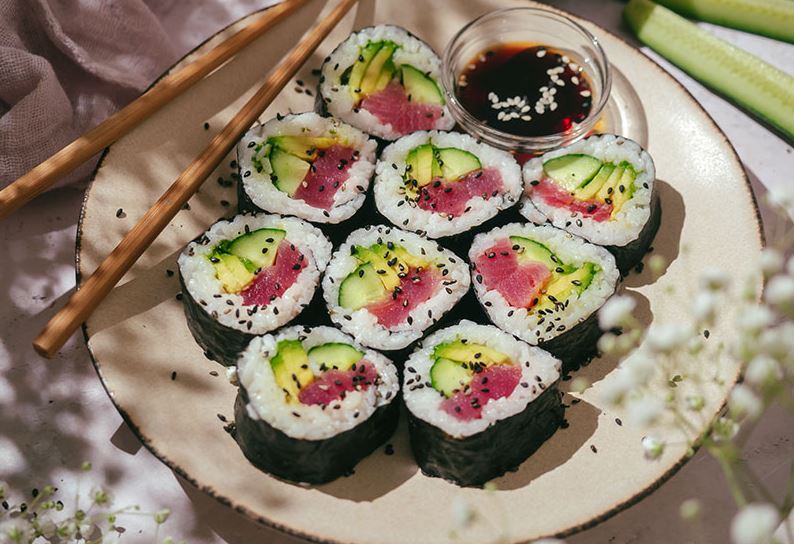Sushi, a popular Japanese dish, has found its way onto tables worldwide. For Muslims, ensuring that food complies with halal dietary laws is crucial. This article explores whether sushi fits within these guidelines, considering both ingredients and preparation methods. By understanding the nuances of halal and haram, you can make informed choices about enjoying sushi while adhering to Islamic dietary laws.
Table of Contents
Is Sushi Halal?
Sushi, a beloved Japanese dish, raises questions about its halal status among Muslims. The halal status of sushi primarily depends on its ingredients and preparation methods. Fish and seafood commonly used in sushi, such as tuna and salmon, are generally considered halal.
However, certain seafood, like shellfish, and fish without scales, like eel, are debated among scholars. Additionally, the presence of ingredients like mirin, a rice wine, can make sushi non-halal. Therefore, ensuring that no haram ingredients are used is crucial. Always inquire about the ingredients and opt for halal-certified sushi to enjoy this delicacy within Islamic dietary laws.
Popular Sushi Types and Their Halal Status
Nigiri
Nigiri is a type of sushi consisting of a slice of raw fish atop a small mound of rice. The halal status of nigiri largely depends on the type of fish used. Common fish such as tuna and salmon are generally considered halal, provided they are fresh and uncontaminated. However, nigiri made with shellfish or eel requires careful consideration, as these may not be halal according to some scholars.
Maki
Maki rolls are made by wrapping fish, vegetables, and rice in nori seaweed. The key to ensuring maki is halal is to verify the ingredients. Fish and vegetables are typically halal, but it’s crucial to avoid any rolls that include non-halal items like imitation crab or sauces containing mirin. Always ask about the specific ingredients used in the roll.
Sashimi
Sashimi, thinly sliced raw fish served without rice, is one of the simplest forms of sushi. Its halal status depends solely on the type of fish. As long as the fish is halal, such as tuna or salmon, and is prepared without any non-halal additives, sashimi can be enjoyed without concern.
California Roll
A popular type of maki, the California roll usually contains imitation crab, avocado, and cucumber. While the vegetables are halal, imitation crab can be problematic. It’s often made from fish paste but may include non-halal additives. Check for halal certification or opt for a different filling to ensure compliance with dietary laws.
Eel Roll (Unagi)
Eel, or unagi, is frequently used in sushi but is often prepared with a sweet sauce that contains mirin or sake. Since these ingredients contain alcohol, they render the eel roll haram. It’s best to avoid eel rolls unless you can confirm that they are made without any non-halal ingredients.
Frequently Asked Questions (F.A.Q)
Is all seafood halal in sushi?
Most seafood is halal, but some scholars debate the permissibility of shellfish and fish without scales. Always verify the type of seafood used.
Can soy sauce in sushi be non-halal?
Yes, some soy sauces may contain alcohol due to fermentation. Check the ingredients or choose soy sauce labeled as halal.
Is imitation crab in sushi halal?
Imitation crab can sometimes contain non-halal additives. It’s best to check the ingredients and look for halal certification.
How can I avoid cross-contamination in sushi preparation?
Ensure that separate utensils and preparation areas are used for halal and non-halal foods. Always ask about the restaurant’s food handling practices.
Wrapping Up
Enjoying sushi while adhering to halal dietary laws is possible with a bit of vigilance. You can savor this popular dish without compromising your beliefs by understanding the ingredients, verifying the preparation methods, and choosing halal-certified establishments. Always ask questions and ensure that your food meets the halal standards you adhere to.
